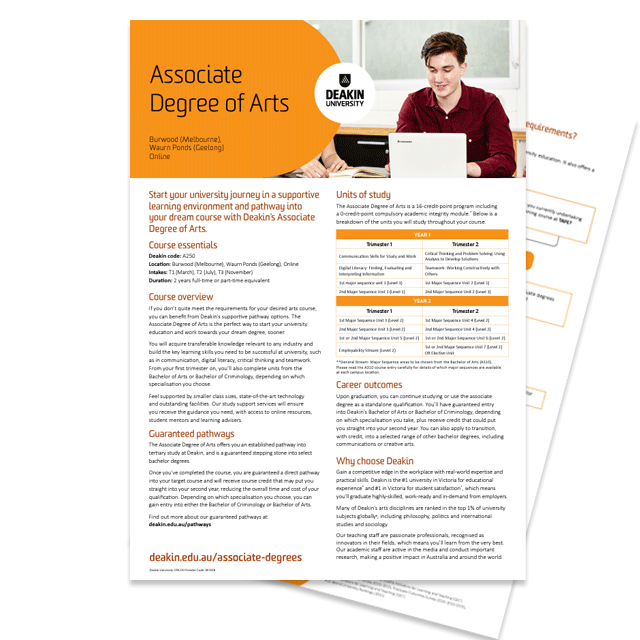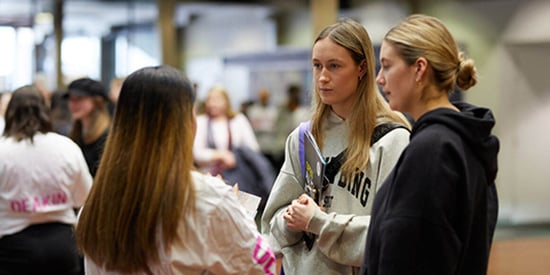Graduate with a pathway into select Deakin degrees
Top 1% of universities worldwide*
Be supported by dedicated teaching staff
Key facts
Key dates
Direct applications to Deakin for Trimester 2 2024 close 23 June 2024
Current Deakin Students
To access your official course details for the year you started your degree, please visit the handbook
Course overview
University can be a challenge, which is why we have designed a course that offers you a supported learning environment and a guaranteed pathway into Deakin's Bachelor of Arts or Bachelor of Criminology. The Associate Degree of Arts teaches you the learning skills you need to be successful at university, including communication, digital literacy, critical thinking and teamwork skills.
From day one you will be a part of the Deakin community and campus atmosphere. From your first trimester, you will also complete units from your target degree (depending on which stream you choose) to ensure you are ready to transition into your bachelor degree.
Choose from the general or criminology stream and learn how to navigate university in a supportive learning environment. You will experience smaller class sizes with world-class teachers in our state-of-the-art facilities, and get a taste of what it takes to become a successful university student.
Are you interested in studying at university but not sure you meet the entry requirements for a bachelor degree?
Deakin's Associate Degree of Arts is the perfect stepping stone to university study. You'll benefit from supported entry into tertiary study, while building your confidence and skills to complete your target degree.
In addition to foundation units, you can follow your passions by choosing from a range of electives including:
- advertising
- anthropology
- design
- English - children's literature
- English - creative writing
- history
- international relations
- journalism
- media studies
- professional experience and practice
- public relations
- sociology
- visual arts.
If you are choosing the criminology stream, you will learn the core theories and knowledge around crime, plus have the opportunity to select a range of electives to complement your studies.
Studying an associate degree prepares you to successfully complete further university study setting you up for a wider range of career opportunities.
Read MoreCourse information
- Award granted
- Associate Degree of Arts
- Year
2024 course information
- VTAC code
- 1400310251 - Waurn Ponds (Geelong), Commonwealth Supported Place (HECS)
1400510251 - Burwood (Melbourne), Commonwealth Supported Place (HECS) - Deakin code
- A250
- Level
- Undergraduate
- Australian Qualifications Framework (AQF) recognition
The award conferred upon completion is recognised in the Australian Qualifications Framework at Level 6.
Course structure
To qualify for the Associate Degree of Arts students will be required to complete 16 credit points of study, comprising:
- 4 credit points of foundation units
- 12 credit points of units taken from the General stream or the Criminology stream
- a maximum of 10 credit points at level 1
- Academic Integrity Module DAI001 Academic Integrity Module (0-credit-point compulsory unit)
4
Foundation units
12
General or Criminology units
16
Total units
Foundation units
General stream
Major Sequence areas to be chosen from the Bachelor of Arts (A310).
Please read the A310 course entry carefully for details of which major sequences are available at each campus location.
1 Employability sequence* credit point from the list below
OR
2 units from a first major sequence at level 1
2 units from a second major sequence at level 1
2 units from first major sequence at level 2
2 units from second major sequence at level 2
2 additional units from either the first or second major at level 2
1 additional unit from either the first or second major at level 2 OR 1 elective at level 1 or 2**
Maximum of 10 credit points at level 1
*AWL2XX must be taken in year 2
**Electives may be taken from inside or outside the Faculty of Arts and Education. Electives in year 1 are recommended to be level 1 only.
***Students who wish to undertake a double major in the Bachelor of Arts must take an additional unit in that major rather than an elective.
Criminology stream
Plus 6 electives at level 1 or 2 *
Maximum of 10 credit points at level 1
* Electives may be taken inside or outside the Faculty of Arts and Education. Electives in year 1 are recommended to be level 1 only.
Intakes by location
The availability of a course varies across locations and intakes. This means that a course offered in Trimester 1 may not be offered in the same location for Trimester 2 or 3. Check each intake for up-to-date information on when and where you can commence your studies.
Trimester 1 - March
- Start date: March
- Available at:
- Burwood (Melbourne)
- Waurn Ponds (Geelong)
Trimester 2 - July
- Start date: July
- Available at:
- Burwood (Melbourne)
- Waurn Ponds (Geelong)
Deakin splits the academic year into three terms, known as trimesters. Most students usually undertake two trimesters each year (March-June, July-November).
Additional course information
Course duration
Course duration may be affected by delays in completing course requirements, such as accessing or completing work placements.
Need help?
Ask a question about studying at Deakin
Entry requirements
Selection is based on a holistic consideration of your academic merit, work experience, likelihood of success, availability of places, participation requirements, regulatory requirements, and individual circumstances. You will need to meet the minimum academic and English language proficiency requirements to be considered for selection, but this does not guarantee admission.
Academic requirements
To be considered for admission to this degree you will need to meet at least one of the following criteria:
- successful completion of a Senior Secondary Certificate of Education
- completion of a certificate III or higher in any discipline
English language proficiency requirements
To meet the English language proficiency requirements of this course, you will need to demonstrate at least one of the following:
- secondary schooling in English
- IELTS 5.5
- other evidence of English language proficiency (learn more about other ways to satisfy the requirements)
Non-academic requirements
All applicants for the Associate Degree of Arts must complete the Associate Degree of Arts Personal Statement Form where in approximately 500-words, you provide your name, highest qualification and an outline of your motivation to study and future aspirations.
Selection adjustments
Access and equity
Special entry access schemes (SEAS) enable Deakin to consider disadvantaged circumstances you may have experienced and the impact upon your studies. SEAS also allows us to identify if you’re from under-represented groups when making selection decisions for some courses. SEAS does not exempt you from meeting any of the course entry requirements. Learn more about Deakin’s special entry access schemes.
Admissions information
Learn more about Deakin courses and how we compare to other universities when it comes to the quality of our teaching and learning. We're also committed to admissions transparency. Read about our first intake of 2023 students (PDF, 354KB) – their average ATARs, whether they had any previous higher education experience and more.
Not sure if you can get into Deakin? Discover the different entry pathways we offer and study options available to you, no matter your ATAR or education history.
Recognition of prior learning
The University aims to provide students with as much credit as possible for approved prior study or informal learning which exceeds the normal entrance requirements for the course and is within the constraints of the course regulations. Students are required to complete a minimum of one-third of the course at Deakin University, or four credit points, whichever is the greater. In the case of certificates, including graduate certificates, a minimum of two credit points within the course must be completed at Deakin.
You can also refer to the Recognition of prior learning system which outlines the credit that may be granted towards a Deakin University degree and how to apply for credit.
Fees and scholarships
Fee information
Learn more about fees.
The tuition fees you pay will depend on the units you choose to study as each unit has its own costs. The 'Estimated tuition fee' is provided as a guide only based on a typical enrolment of students undertaking the first year of this course. The cost will vary depending on the units you choose, your study load, the time it takes to complete your course and any approved Recognition of prior learning you have. Each unit you enrol in has a credit point value.
The 'Estimated tuition fee' is calculated by adding together 8 credit points of a typical combination of units for that course. Eight credit points is used as it represents a typical full-time enrolment load for a year. You can find the credit point value of each unit under the Unit Description by searching for the unit in the Handbook. Learn more about fees and available payment options on our Current students fees website.
Scholarship options
A Deakin scholarship could help you pay for your course fees, living costs and study materials. If you've got something special to offer Deakin - or maybe you just need a bit of extra support - we've got a scholarship opportunity for you. Search or browse through our scholarships
Apply now
Applications for Trimester 1, 2025 open in August. Each year, thousands of students prepare for uni with the help of Deakin support services. We offer a huge range of support, including one-on-one consultations, webinars, online resources and events throughout the year.
Some of our courses have limited places available - for the latest on courses still open for application, visit Courses by trimester.
Create an account in the Deakin Application Portal, start your application, enter personal details, education experience, upload supporting documents and submit. Need help? Play this video, or contact one of our friendly future student advisers on 1800 693 888 or submit an online enquiry.
Entry pathways
Students who successfully complete the A250 Associate Degree of Arts are guaranteed entry into A310 Bachelor of Arts (General stream students) or A329 Bachelor of Criminology (Criminology Stream students) and may receive up to 16 credit points of Recognition of prior learning into these courses.
Following successful completion of the Associate Degree of Arts, students may also apply to transition, with credit, into a selected range of other Bachelor degrees, including Communications, Psychology, Health Science, Nursing, Commerce, Management or Science (including Marine Biology).
Contact information
Our friendly advisers are available to speak to you one-on-one about your study options, support services and how we can help you further your career.
- Call us: 1800 693 888 Mon–Fri, 9am–5pm
- Live Chat: Mon–Thurs, 8am–7pm, Fri 8am–5pm
- Submit an online enquiry
- Help hub find common and trending questions and answers
Careers
Want a degree that’s more than just a qualification? Our industry connections, world-class facilities and practical approach to learning are just some of the reasons why Deakin students graduate confident and ready to thrive in the jobs of tomorrow.
Career outcomes
Upon graduation from the Associate Degree of Arts, you will have the opportunity to continue studying or use the degree as a standalone qualification. You will have guaranteed entry into our Bachelor of Arts or Bachelor of Criminology depending on which specialisation you take, plus receive credit that could put you straight into your second year.
You will also have the opportunity to apply to transition into other bachelor degrees, including communication, design, psychology, health science, nursing, commerce, management or science.
An associate degree equips you with the skills to succeed in both university and your career.
For more information go to DeakinTALENT
Course learning outcomes
Deakin's graduate learning outcomes describe the knowledge and capabilities graduates can demonstrate at the completion of their course. These outcomes mean that regardless of the Deakin course you undertake, you can rest assured your degree will teach you the skills and professional attributes that employers value. They'll set you up to learn and work effectively in the future.
General stream
| Deakin Graduate Learning Outcomes | Course Learning Outcomes |
| Discipline-specific knowledge and capabilities | Acquire broad theoretical knowledge of and academic skills in the Arts, with some depth in the underlying principles and concepts in one or more disciplines or areas of practice in the Humanities, Social Sciences and/or the Creative Arts. Develop cognitive, technical and creative skills to understand discipline specific language in the Arts and apply this knowledge in employment contexts or for further studies. |
| Communication | Acquire skills in oral, written and electronic communication and the ability to use these skills to coherently present knowledge and ideas in a range or contexts. |
| Digital literacy | Research, analyse and communicate information in using knowledge of, and technical skills in a range of digital technologies. |
| Critical thinking | Use cognitive skills to identify analyse and critically evaluate information through the application of principles, concepts and techniques in one or more disciplines or areas of practice in the Humanities, Social Sciences and/or the Creative Arts. |
| Problem solving | Apply cognitive, technical and analytical skills and knowledge of principles and concepts in the Arts to investigate and transmit responses to sometimes complex problems in the Humanities, Social Sciences and/or the Creative Arts. |
| Self-management | Act with autonomy, responsibility and accountability in learning and working independently and in collaboration with others in professional, and scholarly contexts. |
| Teamwork | Work and learn collaboratively with others and as a member of a team. |
| Global citizenship | Understand and appreciate international perspectives in a global environment and act with awareness of ethics, cultural diversity and social responsibility in academic and work environments. |
Criminology stream
| Deakin Graduate Learning Outcomes | Course Learning Outcomes |
| Discipline-specific knowledge and capabilities | Review and analyse major social science theories and key criminological concepts, theories and technical knowledge relating to crime and criminal justice issues, including the causes and consequences of crime, ways of responding to crime, and core debates in policing and security as well as broader issues of policy and politics, inclusion and exclusion, governing and governance, security, social justice, citizenship and human rights. |
| Communication | Effectively communicate the findings and analyses of criminological concepts, theories and technical knowledge, in a selection of written, digital and oral formats, to a range of audiences. |
| Digital literacy | Employ a range of generic and specialist criminal justice-specific digital communication technologies to apply criminological knowledge, conduct research and deliver reports and presentations to a diverse range of audiences. |
| Critical thinking | Analyse and critically evaluate theoretical approaches to crime problems and current policies and practices of governments and criminal justice practitioners and professions. |
| Problem solving | Employ initiative and creativity in conjunction with accepted evidence-based criminological methods to identify solutions to sometimes complex problems in criminology. |
| Self-management | Demonstrate autonomy, responsibility, accountability and a continued commitment to learning and skills development in the criminological field. |
| Teamwork | Work and learn collaboratively with others in the criminology field and from different disciplines and backgrounds while still maintaining responsibility for their own learning. |
| Global citizenship | Analyse and address criminological issues in the domestic and global context taking into consideration cultural and socio-economic diversity, social and environmental responsibility and the application of the highest ethical standards. |
Events Explore more events
Footnotes
*ARWU Rankings 2022
^QS Stars University Ratings 2016–2017
#Year on year, our undergraduate students are the most-satisfied students of all Victorian universities. Australian Graduate Survey 2010–2015, Graduate Outcomes Survey 2016–2019 (GOS), Quality Indicators for Learning and Teaching (QILT).





